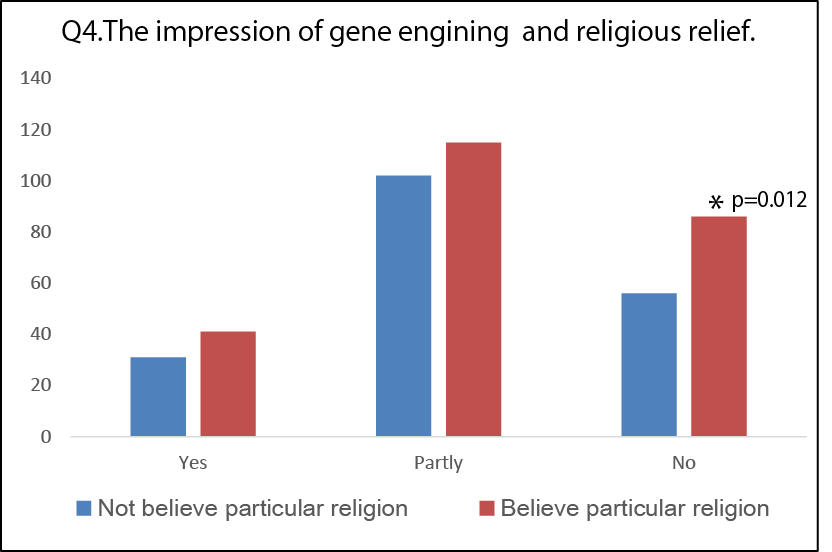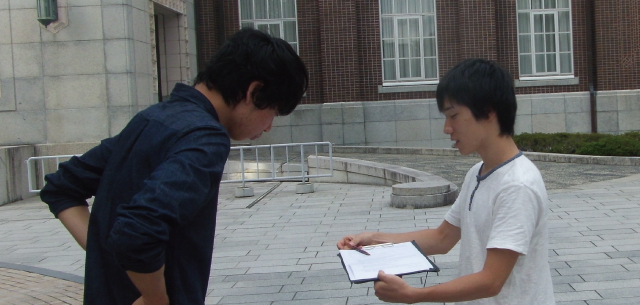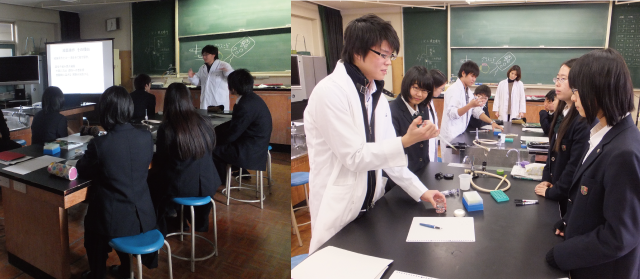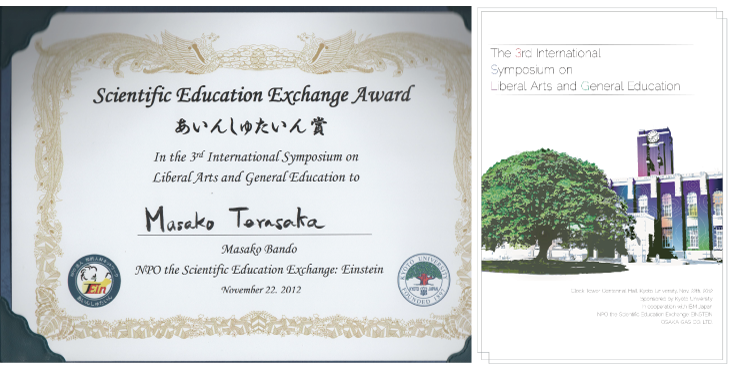Team:Kyoto/Humanpractice
From 2013.igem.org
(→HumanPractice) |
|||
| (225 intermediate revisions not shown) | |||
| Line 2: | Line 2: | ||
<div id="kyoto-main"> | <div id="kyoto-main"> | ||
<div class="texts"> | <div class="texts"> | ||
| - | = | + | =Human Practices<br> -To spread LIFESCIENCE throughout the world= |
| - | + | ||
| - | + | ||
| - | + | ||
| - | + | ||
| - | + | ||
| - | + | ||
| - | + | ||
| - | + | ==Introduction== | |
| - | + | ||
| - | + | ||
| - | + | This year,iGEM Kyoto carried out activities to enrich people's knowledge on biotechnology because in 2010 we and other iGEM teams in Japan carried out [https://2010.igem.org/Team:Kyoto/HumanPractice an attitude survey towards genetically modifying and genetically engineering]. From this survey, we concluded that it is important to enrich the people's knowledge on biotechnology when we want public people to accept biotechnology more. Therefore, we carried out these activities '''as below'''. | |
| - | + | ||
| - | + | * [[#seminar|Life Science Seminar in High School]] | |
| - | + | * [[#nf|Poster session at the school festival]] | |
| + | * [[#symposium|The 3rd international symposium on liberal arts and general education in Kyoto University]] | ||
| + | * [[#iss|International Student Seminar]] | ||
| + | * [[#start|Join "START"]] | ||
| - | + | We had been carrying out these activities shown above in order to spread the basic ideas of biotechnology. However, we thought that there might be other reasons towards the fact that people are not positive to the achievements of them. Therefore, in order to determine the factors, we conducted a questionnaire. | |
| - | + | ||
| - | + | ==Methods== | |
| - | + | ||
| - | + | ;*<FONT size="3"><B><U>How to conduct questionnaire survey</U></B></FONT><br> | |
| - | + | ||
| - | ''' | + | In the beginning of this questionnaire, we asked answerers about their sex, country, age, religion, and profession. And, we investigated how these elements influence the answers of this questionnaire about gene modification. We conducted this survey to Japanese and non-japanese people. The countries where we conducted the questionnaire is listed below. |
| - | + | ||
| + | U.S.A.: Stanford, Davis/ | ||
| + | Germany: Goettingen/ | ||
| + | Japan: Kyoto, Nara, Shiga, Okinawa/ | ||
| + | |||
| + | ※How to confirm significant differences<br> | ||
| + | Chi-square test: To test statistically the difference between the expected frequency with the measured frequency.If calculated probability (p-value) is less than 0.05, significance is confirmed statistically. | ||
| + | |||
| + | |||
| + | |||
| + | ;*<FONT size="3"><B><U>Content</U></B></FONT><br> | ||
| + | '''Questionnaire!!!!'''<br> | ||
| + | Q1 Have you ever thought about experiments using living things?<br> | ||
| + | 1 Yes | ||
| + | 2 No<br><br> | ||
| + | Q2 Do you think these experiments using living-creatures are permissible? Please give X as many as you think it is permissible. <br> | ||
| + | 1 check | ||
| + | 2 no check<br> | ||
| + | Q2.1 Subjects are killed in the experiment, but it can save people in disease. <br> | ||
| + | Q2.2 Subjects can be killed in the experiment, but it can save people in disease.<br> | ||
| + | Q2.3 Subjects are not killed in the experiment but they never go back in nature. However, it can save people in disease.<br> | ||
| + | Q2.4 Subjects are only observed in nature and it can save people in disease. <br> | ||
| + | Q2.5 Subjects are killed in the experiment, but it can improve our life.<br> | ||
| + | Q2.6 Subjects can be killed in the experiment, but it can improve our life.<br> | ||
| + | Q2.7 Subjects are not killed in the experiment but they never go back in nature. However, it can improve our life.<br> | ||
| + | Q2.8 Subjects are only observed in nature and it can improve our life.<br> | ||
| + | Q2.9 Subjects are killed in the experiment, but it can advance science.<br> | ||
| + | Q2.10 Subjects can be killed in the experiment, but it can advance science.<br> | ||
| + | Q2.11 Subjects are not killed in the experiment but they never go back in nature. However, it can advance science.<br> | ||
| + | Q2.12 Subjects are only observed in nature and it can advance science.<br><br> | ||
| + | Q3 How much do you know about genetically modifying (GM) technology?<br> | ||
| + | 1 I know well. | ||
| + | 2 I know only its name. | ||
| + | 3 I do not know at all.<br><br> | ||
| + | Q4 Do you think modifying creature’s gene is ethically permissible or not?<br> | ||
| + | 1 Yes, we can modify every creatures’ gene. | ||
| + | 2 Partly yes, some can be but others are not. | ||
| + | 3 No, any living things’ gene cannot be modified.<br><br> | ||
| + | Q5 Who answered ‘partly yes’ to the fifth question, please answer this question. Which of these creatures’ gene can be modified? Please give X as many as you think it is permissible. <br> | ||
| + | 1 check | ||
| + | 2 no check<br> | ||
| + | Q5.1 Bacteria Q5.2 wheat Q5.3 honeybee Q5.4 killifish Q5.5 frog | ||
| + | Q5.6 chickens Q5.7 mouse Q5.8 dog Q5.9 monkey Q5.10 human beings<br><br><br> | ||
| + | |||
| + | ==Results== | ||
| + | Q4.The impression of gene engining and religious relief. <br><br><br> | ||
| + | |||
| + | [[File:Q4..ping.png|900px|600px]]<br> | ||
| + | Yes p=0.239 Partly yes p=0.378 No p=0.0118 <br> | ||
| + | We checked the correlation between whether people have specific religion and their answers to Q4.<br> | ||
| + | There is no significant difference between whether people have specific religion and the answer “YES/ Partly YES”. | ||
| + | There is a significant difference between whether people have specific religion and the answer “NO”.<br> | ||
| + | In conclusion, it seems that whether having specific religion can influence whether GM is ethically permissible or not.<br><br> | ||
| + | |||
| + | [https://2013.igem.org/Team:Kyoto/Humanpractice/Data (All the results of the questionnaire)]<br> | ||
| + | |||
| + | [https://static.igem.org/mediawiki/2013/6/67/Kyoto_questionnaire_raw.xls Download raw data(xls)] | ||
| + | |||
| + | <br><br><br> | ||
| + | |||
| + | ==Conclusion== | ||
| + | |||
| + | In the result of the questionnaire we conducted in 2013, we can see the influence of religion. To the contrary, the effect of knowledge level is not observed. However, in the questionnaire in 2010, people’s attitude varied according to knowledge level. In this time, since our aim is to shed light on effect except for knowledge, we made fewer question to measure knowledge level. This is why a knowledge level made next to no difference to this survey. Learning from the result of the two survey, because we should not interfere with others’ religion, we have to give them knowledge about synthetic biology considering what each individual believe in. | ||
| + | <br><br> | ||
| + | |||
| + | ;*<FONT size="3"><B><U>Future Work</U></B></FONT><br><br> | ||
| + | From the questionnaire we conducted, there seemed to be a difference in the tolerance of genetically modification, depending on the answers’ religion. Moreover, this difference may have generated not only from religion but also from the difference between region and culture. We would like to conduct surveys on factors such as region, culture, economic development, and so on, in order to find out which factor influence the tolerance. | ||
| + | [[File:anke-to.png]]<br> | ||
| + | |||
| + | ==Other Activities== | ||
| + | <html><a name="seminar"></a></html> | ||
| + | ===Life Science Seminar in High School=== | ||
| + | |||
| + | Toyonaka high school conducts some programs to increase the number of students who learn university-level biology. | ||
| + | As one of the programs, we held a seminar in Toyonaka high school at (2013/1/12-13). In this seminar, we lectured molecular biology and experiments to the students. | ||
| + | Through this activity, students seemed to feel a familiarity with life science and we were able to give essential knowledge. | ||
| + | |||
| + | [[File:toyonaka.png]]<br> | ||
| + | |||
| + | <html><a name="nf"></a></html> | ||
| + | ===Poster session at the school festival=== | ||
| + | |||
| + | Our University has a school festival called NF every year. This is one of the biggest events in our university and many people from all around Japan visit it. This year, iGEM Kyoto presented our project to these visitors by poster session, and this was actually broadcasted by a popular Japanese TV news program (Mezamashi TV). Through this TV program, we were able to spread our activity to the general public, and succeeded in increasing general knowledge towards biotechnology and life science. | ||
| + | |||
| + | [[File:NF.png]] | ||
| + | |||
| + | <html><a name="symposium"></a></html> | ||
| + | ===The 3rd international symposium on liberal arts and general education in Kyoto University=== | ||
| + | |||
| + | The 3rd international symposium on liberal arts and general education is a large scale symposium where many students and public people visit. Through presenting our project, we helped people understand life science. Additionally, we received the "Einstein" prize. | ||
| + | |||
| + | <html><a href="https://static.igem.org/mediawiki/2013/0/01/Kyoto_symposium.pdf">reference.pdf</a></html> | ||
| + | |||
| + | [[File:しんぽじうむ.png| 700px]] | ||
| + | |||
| + | <html><a name="iss"></a></html> | ||
| + | |||
| + | ===International Student Seminar=== | ||
| + | |||
| + | iGEM Kyoto participated in the International Student Seminar(ISS). This is a seminar for young scientist from all over the world. We made a presentation about our project in English. In this event, we spread our activity about life science to many people. | ||
| + | |||
| + | [[File:ISS.png]] | ||
| + | |||
| + | <html><a name="start"></a></html> | ||
| + | |||
| + | ===Join "START"=== | ||
| + | |||
| + | iGEM Kyoto joined “START”, a party held in April and welcomed new students to make iGEM’s activities more common. START is a union which consists of 25 students’ organizations, and those 25 organizations encourage students to contribute to global society. For example, help students who want to study abroad, practice English to work in global society, and communicate with foreign universities. | ||
| + | |||
| + | Additionally, most of these organizations perform international scene or positively contribute to the society. Therefore, some famous companies or volunteer organizations visited this party. We advertised iGEM and succeeded in making synthetic biology more popular. | ||
| + | |||
| + | [[File:start.png]] | ||
</div> | </div> | ||
</div> | </div> | ||
{{Template:Kyoto/footer}} | {{Template:Kyoto/footer}} | ||
Latest revision as of 12:48, 10 October 2013
count down
Contents |
Human Practices
-To spread LIFESCIENCE throughout the world
Introduction
This year,iGEM Kyoto carried out activities to enrich people's knowledge on biotechnology because in 2010 we and other iGEM teams in Japan carried out an attitude survey towards genetically modifying and genetically engineering. From this survey, we concluded that it is important to enrich the people's knowledge on biotechnology when we want public people to accept biotechnology more. Therefore, we carried out these activities as below.
- Life Science Seminar in High School
- Poster session at the school festival
- The 3rd international symposium on liberal arts and general education in Kyoto University
- International Student Seminar
- Join "START"
We had been carrying out these activities shown above in order to spread the basic ideas of biotechnology. However, we thought that there might be other reasons towards the fact that people are not positive to the achievements of them. Therefore, in order to determine the factors, we conducted a questionnaire.
Methods
- How to conduct questionnaire survey
- How to conduct questionnaire survey
In the beginning of this questionnaire, we asked answerers about their sex, country, age, religion, and profession. And, we investigated how these elements influence the answers of this questionnaire about gene modification. We conducted this survey to Japanese and non-japanese people. The countries where we conducted the questionnaire is listed below.
U.S.A.: Stanford, Davis/ Germany: Goettingen/ Japan: Kyoto, Nara, Shiga, Okinawa/
※How to confirm significant differences
Chi-square test: To test statistically the difference between the expected frequency with the measured frequency.If calculated probability (p-value) is less than 0.05, significance is confirmed statistically.
- Content
- Content
Questionnaire!!!!
Q1 Have you ever thought about experiments using living things?
1 Yes
2 No
Q2 Do you think these experiments using living-creatures are permissible? Please give X as many as you think it is permissible.
1 check
2 no check
Q2.1 Subjects are killed in the experiment, but it can save people in disease.
Q2.2 Subjects can be killed in the experiment, but it can save people in disease.
Q2.3 Subjects are not killed in the experiment but they never go back in nature. However, it can save people in disease.
Q2.4 Subjects are only observed in nature and it can save people in disease.
Q2.5 Subjects are killed in the experiment, but it can improve our life.
Q2.6 Subjects can be killed in the experiment, but it can improve our life.
Q2.7 Subjects are not killed in the experiment but they never go back in nature. However, it can improve our life.
Q2.8 Subjects are only observed in nature and it can improve our life.
Q2.9 Subjects are killed in the experiment, but it can advance science.
Q2.10 Subjects can be killed in the experiment, but it can advance science.
Q2.11 Subjects are not killed in the experiment but they never go back in nature. However, it can advance science.
Q2.12 Subjects are only observed in nature and it can advance science.
Q3 How much do you know about genetically modifying (GM) technology?
1 I know well.
2 I know only its name.
3 I do not know at all.
Q4 Do you think modifying creature’s gene is ethically permissible or not?
1 Yes, we can modify every creatures’ gene.
2 Partly yes, some can be but others are not.
3 No, any living things’ gene cannot be modified.
Q5 Who answered ‘partly yes’ to the fifth question, please answer this question. Which of these creatures’ gene can be modified? Please give X as many as you think it is permissible.
1 check
2 no check
Q5.1 Bacteria Q5.2 wheat Q5.3 honeybee Q5.4 killifish Q5.5 frog
Q5.6 chickens Q5.7 mouse Q5.8 dog Q5.9 monkey Q5.10 human beings
Results
Q4.The impression of gene engining and religious relief.

Yes p=0.239 Partly yes p=0.378 No p=0.0118
We checked the correlation between whether people have specific religion and their answers to Q4.
There is no significant difference between whether people have specific religion and the answer “YES/ Partly YES”.
There is a significant difference between whether people have specific religion and the answer “NO”.
In conclusion, it seems that whether having specific religion can influence whether GM is ethically permissible or not.
(All the results of the questionnaire)
Conclusion
In the result of the questionnaire we conducted in 2013, we can see the influence of religion. To the contrary, the effect of knowledge level is not observed. However, in the questionnaire in 2010, people’s attitude varied according to knowledge level. In this time, since our aim is to shed light on effect except for knowledge, we made fewer question to measure knowledge level. This is why a knowledge level made next to no difference to this survey. Learning from the result of the two survey, because we should not interfere with others’ religion, we have to give them knowledge about synthetic biology considering what each individual believe in.
- Future Work
- Future Work
From the questionnaire we conducted, there seemed to be a difference in the tolerance of genetically modification, depending on the answers’ religion. Moreover, this difference may have generated not only from religion but also from the difference between region and culture. We would like to conduct surveys on factors such as region, culture, economic development, and so on, in order to find out which factor influence the tolerance.

Other Activities
Life Science Seminar in High School
Toyonaka high school conducts some programs to increase the number of students who learn university-level biology. As one of the programs, we held a seminar in Toyonaka high school at (2013/1/12-13). In this seminar, we lectured molecular biology and experiments to the students. Through this activity, students seemed to feel a familiarity with life science and we were able to give essential knowledge.
Poster session at the school festival
Our University has a school festival called NF every year. This is one of the biggest events in our university and many people from all around Japan visit it. This year, iGEM Kyoto presented our project to these visitors by poster session, and this was actually broadcasted by a popular Japanese TV news program (Mezamashi TV). Through this TV program, we were able to spread our activity to the general public, and succeeded in increasing general knowledge towards biotechnology and life science.
The 3rd international symposium on liberal arts and general education in Kyoto University
The 3rd international symposium on liberal arts and general education is a large scale symposium where many students and public people visit. Through presenting our project, we helped people understand life science. Additionally, we received the "Einstein" prize.
International Student Seminar
iGEM Kyoto participated in the International Student Seminar(ISS). This is a seminar for young scientist from all over the world. We made a presentation about our project in English. In this event, we spread our activity about life science to many people.
Join "START"
iGEM Kyoto joined “START”, a party held in April and welcomed new students to make iGEM’s activities more common. START is a union which consists of 25 students’ organizations, and those 25 organizations encourage students to contribute to global society. For example, help students who want to study abroad, practice English to work in global society, and communicate with foreign universities.
Additionally, most of these organizations perform international scene or positively contribute to the society. Therefore, some famous companies or volunteer organizations visited this party. We advertised iGEM and succeeded in making synthetic biology more popular.
 "
"




